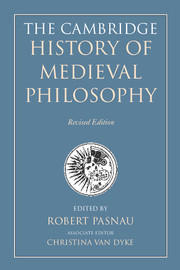Book contents
- Frontmatter
- Contents of Volume 1
- Preface
- List of contributors
- Frontmatter
- Contents of Volume 2
- Introduction
- I Fundamentals
- 1 Origins in baghdad
- 2 The emergence of medieval latin philosophy
- 3 Byzantium
- 4 The rise of the universities
- 5 Monks and friars
- 6 Platonism
- 7 Augustinianism
- 8 Censorship*
- 9 Modernity
- II Logic and language
- III Natural philosophy
- IV Soul and knowledge
- V Will and desire
- VI Ethics
- VII Political philosophy
- VIII Metaphysics
- IX Theology
- Appendices
- Bibliography of primary sources
- Bibliography of secondary sources
- Index nominum
- Index rerum
- References
5 - Monks and friars
from I - Fundamentals
Published online by Cambridge University Press: 05 August 2014
- Frontmatter
- Contents of Volume 1
- Preface
- List of contributors
- Frontmatter
- Contents of Volume 2
- Introduction
- I Fundamentals
- 1 Origins in baghdad
- 2 The emergence of medieval latin philosophy
- 3 Byzantium
- 4 The rise of the universities
- 5 Monks and friars
- 6 Platonism
- 7 Augustinianism
- 8 Censorship*
- 9 Modernity
- II Logic and language
- III Natural philosophy
- IV Soul and knowledge
- V Will and desire
- VI Ethics
- VII Political philosophy
- VIII Metaphysics
- IX Theology
- Appendices
- Bibliography of primary sources
- Bibliography of secondary sources
- Index nominum
- Index rerum
- References
Summary
Most medieval Christian philosophers were clerics and priests, who staffed the schools (and later the universities) in towns and cathedral cities. Many of these were also monks and friars. Monks contributed to philosophy in the cloisters of their monasteries and in universities, and friars also contributed both in the schools or studia of their orders and within universities.
MONKS
The transformation of the Roman Empire, particularly between the fifth and sixth century, was accompanied by educational initiatives on the part of bishoprics and monasteries. Between 397 and 421, Augustine of Hippo outlined a program in his treatise On Christian Doctrine for communicating Christian doctrine into which was integrated the study of profane authors and ancient culture. Influential works were produced in Italy (by Boethius, Cassiodorus, and Pope Gregory the Great) and in Spain (by Isidore of Seville), which enabled active centers of culture in the West as far away as Anglo-Saxon England to counteract the stagnation of imperial decline.
The task of the monk was to escape from this world in order to find God. What place Benedict of Nursia (d. ca. 550), the father of Western monasticism, allowed for scholarly studies by the monks who followed his Rule is not clear, although lectio divina was an obligation that required literacy, books, meditation, and thought. Cassiodorus (d. ca. 580), on the other hand, provided a library in his monastery in Calabria in southwest Italy, called the Vivarium or “fish pond,” from which ancient and Christian books were disseminated throughout Europe – to Northumbria, for example, and to the court of Charlemagne and to Isidore’s Seville. Cassiodorus divided his Institutions into two books: Divine and Human. The first was devoted to the Bible, and the second to the seven liberal arts that provided the introduction for philosophical studies to be integrated into the study of Christian doctrine, following the example of Augustine.
- Type
- Chapter
- Information
- The Cambridge History of Medieval Philosophy , pp. 63 - 75Publisher: Cambridge University PressPrint publication year: 2014



